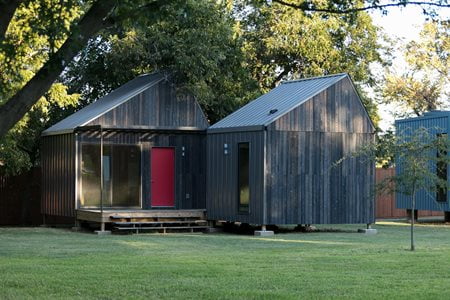Contact
For More Information
Contact the Coalition for Health
Learn more about this partnership and how to contribute by contacting CADRE's Coalition for Health at CoalitionForHealth@cadreresearch.org
To build wellness eco-systems that respond to housing shortages, an aging population, and the promise of digital technology, UTA’s College of Architecture, Planning and Public Affairs (CAPPA) is building an innovative coalition with The Center for Advanced Design, Research, and Evaluation (CADRE) UTA’s Multi-Interprofessional Center for Health Informatics (MICHI) and global design firm, HKS Inc. which is a critical industry partner in this endeavor, contributing professionals in the field as well as start-up funds to engage students and researchers in this effort.
This cross-disciplinary partnership seeks to develop Agile Dwelling Units (ADUs) that can be adapted to respond to housing needs, with an initial focus on aging in place. ADUs outfitted with technology that facilitates wellness and access through telehealth can support independent, secure, and engaged healthy living for a growing aging population. With a focus on equity and providing affordable access to housing based on adaptive design, the partners are building on relationships they have established across the Dallas-Fort Worth area with underserved communities, to engage them in developing best practices for healthy aging in place through the use of technology
The partnership has set a plan for developing a proof-of-concept micro-dwelling led by UTA’s School of Architecture. The project calls for the design of the micro-dwelling, identifying potential industry partners, and the development of a preliminary scan/survey of best practices and opportunities within UTA and outside of the university regarding the healthcare and inter-generational housing design space. This data will inform the development of an Architecture Studio course in Spring 2022 to construct a 200-500 sq. ft. ADU by UTA students at UTA’s Community Design Build Lab. The design lab has completed over 15 design-build projects, and nine structures since 2016 through architecture studios. Students are engaged in designing and contributing to the construction of various forms.


The UTA-CADRE partnership’s goal is to leverage innovation in the built environment and health informatics, while being anchored on social determinants of health and the human and societal experience. A spring 2022 symposium is planned to invite industry partners to hear our discovery to date. This symposium will also help us shape the critical questions needed to build best practices and develop research and practice around Agile Dwelling Units that can respond to the continuum of care from home to health facility while “connected” through technology to allow continued wellness.
We are actively looking for additional industry partners to join us in this coalition through which we hope to make access to health and housing rapidly deployable and fundamentally equitable.
Current Core CADRE-UTA Coalition Members
- Tom Harvey, President, CADRE
- Dr. Upali Nanda, Director of Research, HKS
- Aletta Van der Walt, CADRE
- Brad Bell, Director of UTA Architecture Program
- Dr. Maria Martinez-Cosio, Interim Dean, College of Architecture, Planning and Public Affairs, UTA
- Dr. Gabriela Mustata Wilson, UTA College of Nursing and Health Innovation and UTA’s Multi-Interprofessional Center for Health Informatics

HKS
Interdisciplinary global design firm expanding their team beyond architects and interior designers to include researchers, urban designers, nurses, anthropologists, graphic designers, and more

The Center for Advanced Design, Research, and Evaluation (CADRE)
Advancing design research and evaluation to build a world in which all people have pathways to health and well-being

The Multi-Interprofessional Center for Health Informatics (MICHI)
The Multi-Interprofessional Center for Health Informatics (MICHI) at the University of Texas at Arlington draws from strengths and knowledge of multiple professions and disciplines with the ultimate goal of transitioning from “sick care” to “Health care”.